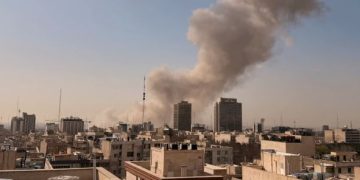After four decades of fostering integration through trade and finance, the global economy has begun a painful process of fragmentation. Initially driven by wealthy countries – namely, the United States under former President Donald Trump and the United Kingdom following the Brexit referendum – several geopolitical forces have combined to accelerate the shift toward deglobalisation.
The fracturing of global trade could herald the fragmentation of international capital markets. COVID-19-related lockdowns and closures have disrupted global supply chains and shut down major production centers, most notably in China. Similarly, the war in Ukraine has altered trade routes and forced Western countries to find alternative suppliers of major commodities like oil, gas, wheat, and fertilizers. Western-led sanctions on Russia have further impeded trade and sharply increased food and energy prices.
But while global trade could become even more fragmented if major economies adopt protectionist policies such as border carbon taxes, financial markets remain strongly integrated. Cross-border capital flows are still largely unregulated and more volatile than ever. It’s a combination that is currently proving to be lethal for many low- and middle-income countries.
The liberalisation of capital accounts in these countries in the 1990s has led to large inflows of “hot money”: private financial capital driven not so much by developing countries’ economic outlook as by developed countries’ macroeconomic policies. In the years following the 2008 global financial crisis, capital flows to emerging and “frontier” markets surged as prolonged monetary expansion by developed countries’ central banks fueled asset bubbles. Financial agents borrowed cheap in dollars and either lent in foreign currency to developing countries or invested in local currency markets. Capital inflows triggered higher interest-rate spreads and currency appreciation, making carry trades particularly lucrative – at least for a while.
Over the years, the inflows of hot money, often held as reserves and invested in low-return dollar assets, have made emerging and developing economies vulnerable to capital flight. This has had a dampening effect on these countries’ fiscal policies, as rising seigniorage costs have stoked fears of credit-rating downgrades.
The rapid interest-rate hikes in the US and the European Union have compounded low- and middle-income countries’ external debt burdens, forcing them to raise interest rates even more aggressively than advanced economies and hindering their recovery from the COVID-19 pandemic. Moreover, these dramatic rate hikes have not prevented fickle foreign investors from fleeing, causing emerging-market currencies to depreciate and severely damaging labour markets and growth prospects.
But the developed countries’ combination of higher interest rates and fiscal consolidation is counterproductive, as it risks causing recessions without addressing the real forces behind surging inflation. As a result of following the US Federal Reserve’s lead, many low- and middle-income countries already face severe stagflation – and integration with global finance is worsening their economic woes.
Instead of mimicking developed countries’ ineffective approach, developing and emerging countries must introduce policies tailored to their specific needs and political economies. Such policies include controlling the prices of key commodities, increasing domestic production to alleviate critical shortages, and ensuring social protections for the newly unemployed and those who are worst affected by high inflation.
Above all, developing countries must introduce more effective capital controls. Imposing constraints on volatile portfolio flows, particularly those that contribute to currency depreciation, is crucial to mitigating the risks associated with financial globalisation. Moreover, just as several developing countries have explicitly or implicitly defied the US-led trade sanctions on Russia, policymakers must break free from the US-dominated international financial system, especially dollar swaps and repo markets.
Given that most developing countries cannot afford to act on their own, regional cooperation is also critical. The United Nations Conference on Trade and Development’s annual report mentions several innovative forms of finance and exchange payments that Global South countries could implement to counter advanced economies’ financial dominance, including “South-South clearing unions.”
If trade among Global South economies grows quickly, the report notes, the flows will be settled in their own currencies or through regional currency mechanisms. Such mechanisms could also help negotiate debt-restructuring deals, provide financial insurance at the regional level, and even establish stabilisation funds to improve countries’ foreign-asset positions.
Financial globalisation was supposed to usher in an era of robust growth and fiscal stability in the developing world. It ended up doing the opposite. Now, to restore their economic viability, low- and middle-income countries must make the most of deglobalisation and embrace the fragmentation of international capital markets.
The writer, Professor of Economics at the University of Massachusetts Amherst, is a member of the UN Secretary-General’s High-Level Advisory Board on Effective Multilateralism. ©Project Syndicate






































